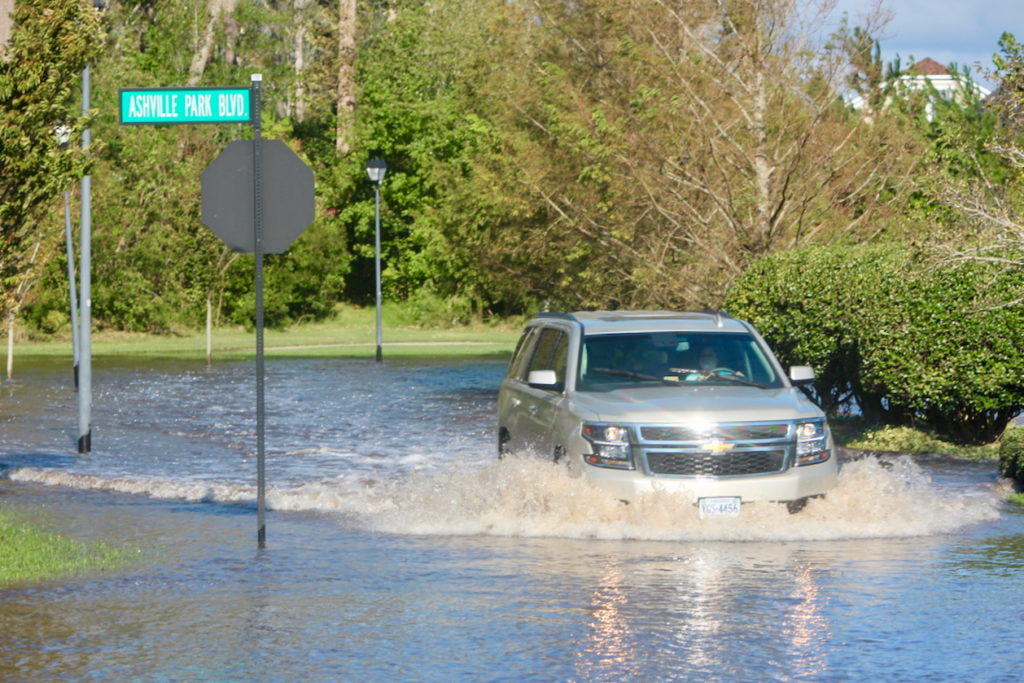
COURTHOUSE — Without action, losses to flooding in Virginia Beach will mount over time, meaning billions of dollars in potential costs over the next few decades, according to an analysis by Old Dominion University.
Losses may carry a massive price tag for citizens and businesses, according to a Tuesday, Oct. 5, presentation to the City Council by Dr. Robert McNab, an economics professor and the director of the university’s Dragas Center of Economic Analysis and Policy.
The study suggests the infusion of money from a bond referendum, meant to speed up numerous projects, would lessen the future burden on the city. The complete study is available at this link.
The analysis estimates that each dollar invested in infrastructure “mitigates about $13 in financial damages and … mitigates approximately $19 in economic losses.” In remarks to the council, McNab referred to the effects of recurrent flooding, which are different from losses seen in a natural disaster event, as “the economic death by a thousand cuts” because many events happen over time and compound the challenges to recovery.
The City Council has asked voters in Virginia Beach, one of the U.S. cities believed to be most susceptible to the effects of sea level rise, to approve a $567.5 bond referendum to fast track key projects. These range from elevating roads to restoring lost submerged aquatic vegetation in Back Bay.
Early voting is already underway, and Election Day is on Tuesday, Nov. 2.
If voters approve the ballot measure, the city would increase real estate taxes to repay the bonds. It might cost the homeowner of a median-priced house valued at $267,600 an additional $115 to $171 more per year in real estate taxes, according to an estimate by the city, depending upon the terms of the bonds.
“The way we looked at this was to say if these damages were unmitigated, that is if nothing was done beyond what’s on the current slate of programs, what would be the cost in terms of financial losses in today’s dollars,” McNab said. “Because this is a stream of damages and benefits over time, we have to bring it into today’s dollars so that we get a way of comparing the two.
“If we look at the estimates,” he added, “it suggests that we are looking at between $4.6 billion and $5.9 billion worth of damages from 2021 to 2069 if recurrent flooding is not mitigated in Virginia Beach. If we look at the ripple effects of that – in other words, the financial damages rippled through the economy, lowering economic output and employment – we can see that the damages increase to $6.1 billion to $7.9 billion in today’s dollars.”
In terms of a benefit to cost comparison, McNab said the money invested now has the potential to avoid much greater costs to the economy over time. “We estimate that for every dollar invested, if the infrastructure project passes, it will mitigate between $4 and $19 worth of damages to the Virginia Beach economy,” he said.
“It is pay me later or invest now,” said City Councilmember John Moss, who holds an at-large seat, describing the situation the city finds itself in as it seeks to speed up the funding of some projects. “I think you’ve made a strong compelling case that investing now – while no one likes to pay higher taxes, certainly not me – but this is about value, and we’re asking people to pay more for a new level of service, Mr. Mayor, not the same level of service.”
“I couldn’t agree more,” Mayor Bobby Dyer said. “A lot of us are risk-adverse to raise taxes or fees unnecessarily, but there comes a time where we have to take – you know, Yogi Berra said, ‘When you come to a fork in the road, take it.’ And this is the one that we’ve got to take.”
City Councilmember Rocky Holcomb, who represents the Kempsville District, pointed out that the ODU report used the same “ripple effect” phrase the city is using as the name of its communications campaign about the referendum.
“I think we have the copyright on that,” Holcomb said.
McNab noted that is a standard phrase for explaining how economic impact modeling works.
“We toss a pebble in the pond, and then we capture the ripple effects from that pebble,” McNabb explained. “One thing to understand is that these are not costs that can be deferred indefinitely. If taxpayers decide now not to fund this referendum, future councils and future taxpayers will be facing a similar decision with these costs already incurred and the ripple effects of those damages throughout the economy.”
City Councilmember Michael Berlucchi, who represents the Rose Hall District, noted how heavily some communities within his district were hit by flooding in the wake of Hurricane Matthew in 2016.
“Many of my neighbors will be the beneficiaries of these flood control projects,” Berlucchi said.
“The economic impact is profound, no doubt about it,” Berlucchi said. “But additional to the economic impact is the human impact, the intangible impacts, the things that we can’t analyze – we can’t measure them – but that I see every day when I talk to people who live in the Rose Hall District and all around the city. It’s anxiety over a rainstorm. It’s extreme anxiety over an approaching tropical storm or hurricane.”
People are still feeling the effects of the 2016 flooding and other storms, he said.
© 2021 Pungo Publishing Co., LLC

